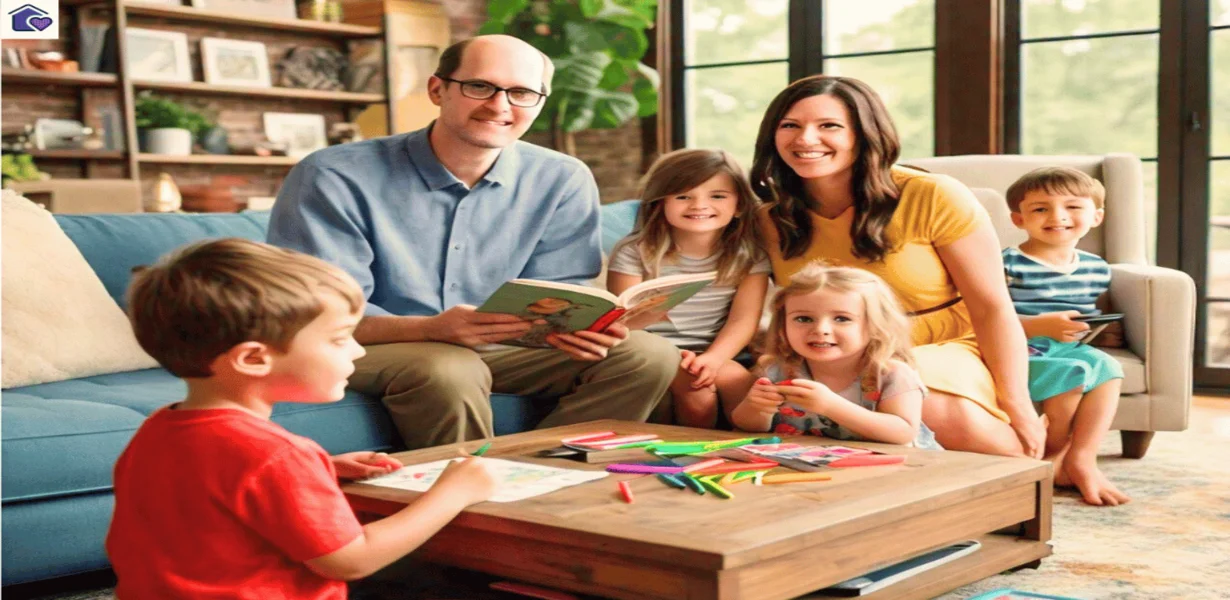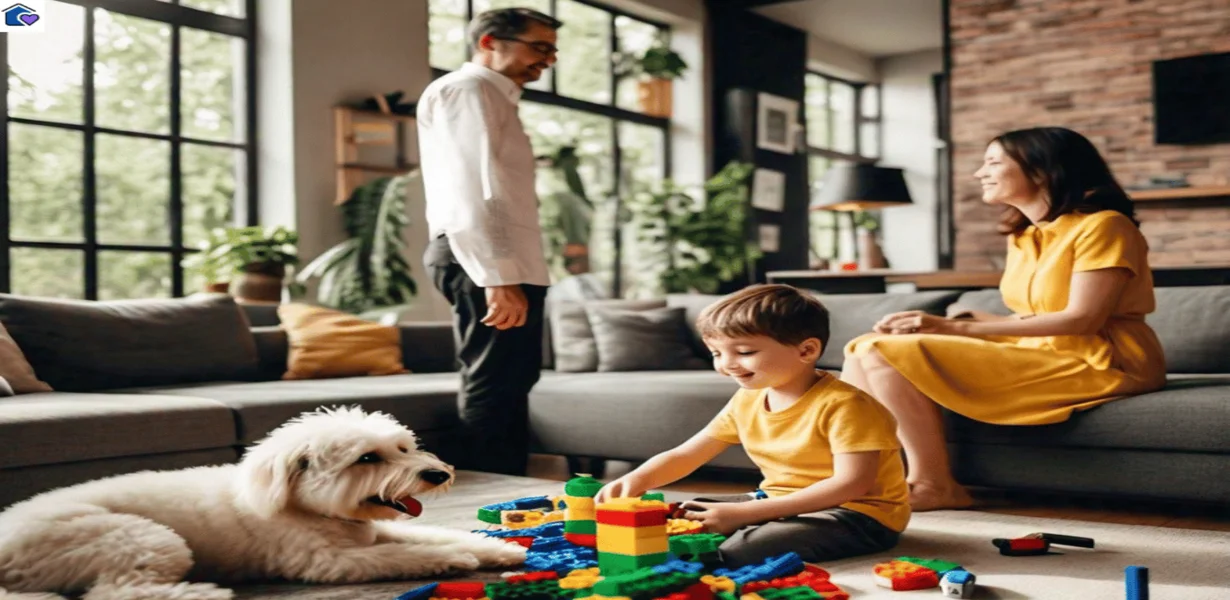Happy Family: Revealing 12 Qualities of a Happy Family
The concept of a happy family is worldwide, yet the way it takes shape varies greatly across cultures, families, and even generations. Despite these differences, there are common threads that weave through happy families, forming a strong and loyal tapestry of love, trust, and connection. While there’s no single recipe for happiness, here we discuss about what the qualities of a happy family are.
-
Unconditional Love: The Foundation of Security
A happy family is centered on unconditional love. Every member is accepted for who they are, warts and all, with this unflinching respect. It offers a feeling of safety and acceptance, a place where individual can be themselves without worrying about being judged.
This love is founded on the fundamental conviction that every member of the family is deserving and important, not on accomplishments or actions. If we are talking about what the qualities of a happy family are, we should know that love without conditions can take many different forms. It’s the comforting hug after a trying day, the silent sympathetic ear during a trying time, and the steadfast encouragement among life’s obstacles.
It’s the offering of forgiveness following errors and the celebration of both minor and large successes. Because of this affection, family members may be open and sincere with one another, which cultivate a sense of trust.
-
Open Communication: Building Bridges of Understanding in Happy family
Good communication is essential to qualities of a happy family. Members can express their needs, wants, and views in a polite and safe setting. This honest discussion develops empathy and compassion by helping people comprehend one another’s viewpoints on a deeper level.
Active listening is just as important to open communication as talking. It involves actually listening to what other people are saying, both audibly and not audibly. It’s about establishing a secure space for honest speech and making room for a variety of perspectives.
Constructive conflict resolution is made possible by effective communication. Families can resolve conflicts cordially by concentrating on comprehending the underlying problems and coming up with solutions that satisfy everyone.
-
Shared Values: A Guiding Compass
Robust families frequently have a central set of values that direct their choices and behaviors. These values could include moral standards, religious convictions, or a dedication to learning, labor, or volunteerism. A common set of values gives people cohesion and direction while acting as a compass through life’s obstacles.
It’s not always the case that people who share principles agree on everything. On the other hand, sharing a common ground facilitates candid conversations about implementing those principles. A family that values honesty, for instance, might have candid discussions about proper conduct or the significance of being truthful.
Common principles offer a basis for bringing up kids and managing challenging circumstances together as a family, which are qualities of a happy family.
-
Supportive Environment: Encouraging Growth and Independence

Contented families foster a nurturing atmosphere in which every individual is motivated to develop and prosper. This entails recognizing each person’s unique gifts and passions, giving them the chance to pursue their interests, and providing direction without becoming intrusive. It’s about giving people a sense of autonomy so they may make their own decisions and grow from them.
Emotional support is another aspect of the qualities of a happy family. In difficult times, family members support one another by lending a sympathetic ear, a helping hand, or just a shoulder to weep on. They uplift one another through difficult times and rejoice in each other’s accomplishments. This guarantees that no one feels alone in their problems and fosters a sense of belonging.
-
Quality Time: Investing in Bonds
It might be difficult to find time for your family in the fast-paced world of today. But spending quality time together to bond and forge relationships is necessary for good qualities of a happy family. Expensive or elaborate excursions are not necessary for this. Simple pastimes like going on a stroll, playing games, or eating dinner together can generate enduring memories and enhance relationships.
Families may unwind, have fun, and just enjoy each other’s company when they spend quality time together. It offers chances for candid conversation, belly laughs, and making priceless memories. Strong familial ties can be greatly enhanced by even brief yet concentrated periods of attention.
-
Healthy Boundaries: Respecting Individuality
While families are a unit, it’s important to respect the individuality of each member. Healthy boundaries allow for personal growth and development. This means respecting personal space, privacy, and time for individual pursuits.
It also involves setting clear expectations and enforcing consequences in a fair and consistent manner. Healthy boundaries allow for independence and a sense of self. They also prevent unhealthy codependency and create a sense of trust and respect within the family unit.
Setting boundaries isn’t about creating distance, it’s about fostering healthy relationships where everyone feels safe, not creating distance. These are also vital qualities of a happy family.
-
Conflict Resolution: Navigating Disagreements
Families naturally disagree from time to time. Instead of avoiding disagreement, happy families adopt constructive coping mechanisms. This entails listening intently, respectfully expressing emotions, and concentrating on coming up with solutions that satisfy everyone.
To resolve conflicts effectively, parties must be willing to make concessions and consider other people’s points of view. Instead than making personal jabs, it’s important to concentrate on the underlying problems. Happy families resolve conflicts by coming up with solutions that take into account the wants and worries of all parties. Respectfully disagreeing with someone is a vital life skill that promotes emotional intelligence and empathy.
-
Adaptability and Resilience: Weathering Life’s Storms

Families are not exempt from the curveballs that life might deliver. Contented families are flexible and strong. They are able to deal with change, overcome obstacles, and draw lessons from hardship. Families that are able to adjust together can become stronger and provide a sense of security in trying times.
A robust support network and a sense of common purpose are the foundations of resilience. Families can rely on one another for support and encouragement during trying times. They have the ability to be optimistic about the future and find comedy in trying circumstances. Families can withstand life’s adversities and come out stronger by developing resilience
9. Forgiveness: Letting Go and Moving Forward
Everyone makes mistakes, and forgiveness is a crucial element in qualities of happy families. It’s about letting go of resentment and anger, allowing individuals to learn from their mistakes and move forward. Forgiveness doesn’t mean condoning the behavior, but rather releasing the negativity associated with it.
Forgiveness can be a difficult process, but it’s essential for maintaining healthy family relationships. It allows families to heal from past hurts and build stronger bonds. By practicing forgiveness, families create a more positive and supportive environment for everyone.
-
Gratitude and Appreciation: Celebrating the Good
Families that are happy don’t take one another for granted. They develop an attitude of appreciation and thankfulness for all of life’s benefits. This entails giving each other gratitude, recognizing contributions, and commemorating both significant and minor successes.
Within the qualities of a happy family, gratitude promotes happiness and a sense of unity. It enables people to treasure their time spent together and recognize the special features in each other. Families that show gratitude to one another make the atmosphere happier and more positive for everyone.
-
Humor and Playfulness: Lightening the Mood
One of the most effective tools for strengthening family bonds is laughter. Joking around, having fun, and finding the funny in ordinary situations all contribute to happiness and levity. Laughing can reduce stress, diffuse tense circumstances, and produce enduring memories.
There are many ways to be playful, such as through board games or outdoor activities. It enables families to unwind, enjoy themselves, and establish deeper connections with one another. A sense of humor that unites family members creates a happy, carefree atmosphere.
-
Commitment: Investing in the Long Haul
Every member of the family must be committed to creating a happy family. It involves devoting time, effort, and resources to fostering connections and advancing one another’s development. This commitment entails giving up something, putting family time first, and overcoming obstacles as a team.
Contented families are aware of their unity as a team and are prepared to work hard to achieve success. Families are able to weather life’s storms and establish an enduring foundation of love and support because of this commitment, which cultivates a sense of security and stability.
In Conclusion
While there’s no one-size-fits-all formula for a happy family, these qualities create a strong foundation for a thriving family unit. By fostering love, respect, communication, and support, families can build a safe haven where individuals can grow and flourish. Remember, a happy family is a journey, not a destination. It’s about nurturing relationships, celebrating victories, and weathering challenges together. By embracing these qualities and making a commitment to each other, families can create a lasting legacy of love and happiness.

More articles you can read
There are some more articles based on different topics regarding to family members and other home issues, if you want to read then visit here, and for more to read about your self-care, you can visit here.
Relevant Post:
- Time Saving Cleaning Tips: Revealing 10 Steps to Clean up Your Tidy Home
- Importance of Money: 6 Best Ways to Teach Every Age Kid About Money
- Retirement Planning: 5 Impressive points to calculate your needs accurately.
- Water Preservation: 6 Effective Strategies and Solutions for a Maintainable Future
- Conflicts with your Spouse: Exclusive 8 ways to resolve Conflicts Between Husband and Wife that Never Fails
- Types of Behaviour: An Exclusive Overview on 10 Behaviours Types
You May Like:
- 151 Bold Cycling Team Names For Your Events in 2024
- 120 Best Police Team Names That Will Arrest Your Attention
- 120 Robotics Team Names: Stand Out in Every Contest
- Best Golf Team Names for 2024 | Funny & Creative also
- 186 Scavenger Hunt Team Names Perfect for Explorers
- 197 Best Kan Jam Team Names; Funny, Clever, & Pop Culture
- Smash the Game: 175 Cool Ping Pong Team Names
- 125 Game-changing Bocce Ball Team Names for 2024
- 162 Best Flag Football Team Names in 2024
- Best 147 Euchre Team Names for an Epic Night
- 207 Best Volleyball Team Names That Are A Hit in 2024
- 273 Badminton Team Names: Smash Your Way to Victory!
- Top 276 Game-Changing Tennis Team Names for 2024
- Inspiring Cell Group Names: Ideas to Unite in 2024
- 209 Best Softball Team Names Trending in 2024
- 6 Shocking Reasons Why CrossFit Ruined My Life?
- 12 Labors CrossFit Columbia in Columbia MD A Comprehensive Guide
- Water Preservation: 6 Effective Strategies and Solutions for a Maintainable Future
- Do CrossFit Athletes Take Steroids? Best Guide 2024
- How Much Does It Cost to Start a CrossFit Gym?
- How can family members effectively solve problems together?
- Common Family Problems and How to Solve Them
- A Complete And Impressive Guide on CrossFit 10 General Physical Skills
